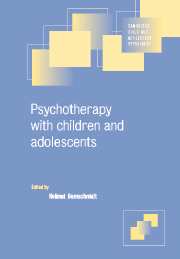Book contents
- Frontmatter
- Contents
- List of contributors
- Preface
- Part I Principles of psychotherapy with children, adolescents and families
- Part II Psychotherapeutic methods and settings
- 5 Psychodynamic therapy
- 6 Behaviour therapy
- 7 Cognitive behaviour therapy
- 8 Interpersonal psychotherapy for adolescents
- 9 Play therapy with children
- 10 Individual psychotherapy with adolescents
- 11 Group psychotherapy and psychodrama
- 12 Family therapy
- 13 Parent training
- 14 Combination of treatment methods
- Part III The practice of psychotherapy for specific disorders in childhood and adolescence
- Part IV The practice of psychotherapy in various settings
- Index
8 - Interpersonal psychotherapy for adolescents
- Frontmatter
- Contents
- List of contributors
- Preface
- Part I Principles of psychotherapy with children, adolescents and families
- Part II Psychotherapeutic methods and settings
- 5 Psychodynamic therapy
- 6 Behaviour therapy
- 7 Cognitive behaviour therapy
- 8 Interpersonal psychotherapy for adolescents
- 9 Play therapy with children
- 10 Individual psychotherapy with adolescents
- 11 Group psychotherapy and psychodrama
- 12 Family therapy
- 13 Parent training
- 14 Combination of treatment methods
- Part III The practice of psychotherapy for specific disorders in childhood and adolescence
- Part IV The practice of psychotherapy in various settings
- Index
Summary
Interpersonal psychotherapy (IPT) was first developed in the mid-1960s as a brief, time-limited psychotherapy for depressed adults (Klerman et al., 1984; Weissman and Markowitz, 1994). Since then, modifications of IPT have been provided to treat specific psychiatric disorders such as eating disorders (Fairburn et al., 1991; Fairburn et al., 1993), drug addiction (Carroll et al., 1991), late depression (Reynolds et al., 1999), antepartum depression (Spinetti, 1997), or to address specific situations such as marital problems, counselling patients with HIV or bipolar disorders (Klerman and Weissman, 1993; Weissman and Markowitz, 1994). A downward extension for adolescents with major depression has also been developed by the Columbia Group (Moreau et al., 1991; Mufson et al., 1993). The goal of this chapter is to outline the main features of interpersonal psychotherapy with depressed adolescents and to review efficacy studies on IPT as a treatment of depression.
Interpersonal psychotherapy for adolescents (IPT-A) is a time-limited treatment for adolescents with major depression, which is suitable for 12– to 18-year-olds with the exclusion of those with high suicidal risk, psychotic depression or bipolar disorder. IPT-A is structured around 12 weekly sessions, and therefore lasts for about 3 months. Unlike most supportive, expressive forms of psychotherapy which are often used to treat depressed adolescents and which are not standardized, IPT-A has a treatment manual available (Mufson et al., 1993) and specific training is required for the therapist. The specific goals of IPT-A are: (i) to alleviate depressive symptoms; and (ii) to improve interpersonal functioning of the depressed adolescent. Thus, IPT-A is a symptom-orientated, highly focused intervention.
- Type
- Chapter
- Information
- Psychotherapy with Children and Adolescents , pp. 124 - 137Publisher: Cambridge University PressPrint publication year: 2001
- 1
- Cited by



